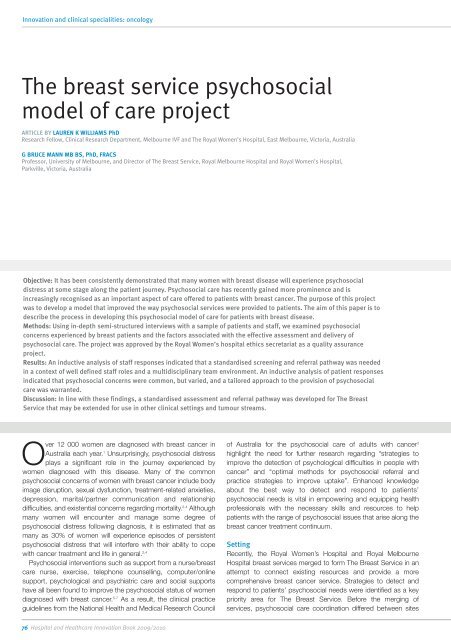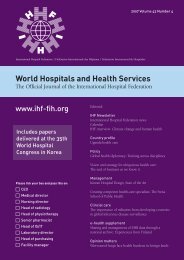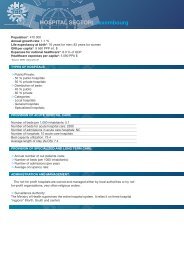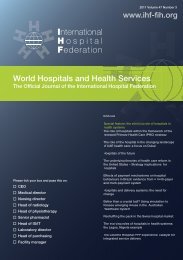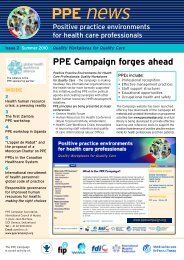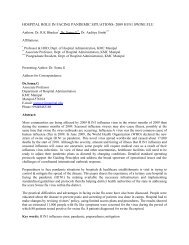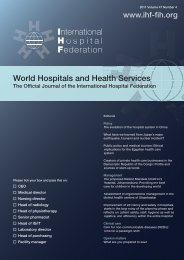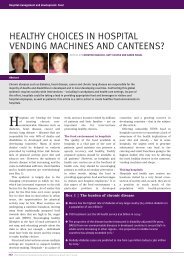Full document - International Hospital Federation
Full document - International Hospital Federation
Full document - International Hospital Federation
Create successful ePaper yourself
Turn your PDF publications into a flip-book with our unique Google optimized e-Paper software.
Innovation and clinical specialities: oncology<br />
The breast service psychosocial<br />
model of care project<br />
ARTICLE BY LAUREN K WILLIAMS PhD<br />
Research Fellow, Clinical Research Department, Melbourne IVF and The Royal Women’s <strong>Hospital</strong>, East Melbourne, Victoria, Australia<br />
G BRUCE MANN MB BS, PhD, FRACS<br />
Professor, University of Melbourne, and Director of The Breast Service, Royal Melbourne <strong>Hospital</strong> and Royal Women’s <strong>Hospital</strong>,<br />
Parkville, Victoria, Australia<br />
Objective: It has been consistently demonstrated that many women with breast disease will experience psychosocial<br />
distress at some stage along the patient journey. Psychosocial care has recently gained more prominence and is<br />
increasingly recognised as an important aspect of care offered to patients with breast cancer. The purpose of this project<br />
was to develop a model that improved the way psychosocial services were provided to patients. The aim of this paper is to<br />
describe the process in developing this psychosocial model of care for patients with breast disease.<br />
Methods: Using in-depth semi-structured interviews with a sample of patients and staff, we examined psychosocial<br />
concerns experienced by breast patients and the factors associated with the effective assessment and delivery of<br />
psychosocial care. The project was approved by the Royal Women’s hospital ethics secretariat as a quality assurance<br />
project.<br />
Results: An inductive analysis of staff responses indicated that a standardised screening and referral pathway was needed<br />
in a context of well defined staff roles and a multidisciplinary team environment. An inductive analysis of patient responses<br />
indicated that psychosocial concerns were common, but varied, and a tailored approach to the provision of psychosocial<br />
care was warranted.<br />
Discussion: In line with these findings, a standardised assessment and referral pathway was developed for The Breast<br />
Service that may be extended for use in other clinical settings and tumour streams.<br />
Over 12 000 women are diagnosed with breast cancer in<br />
Australia each year. 1 Unsurprisingly, psychosocial distress<br />
plays a significant role in the journey experienced by<br />
women diagnosed with this disease. Many of the common<br />
psychosocial concerns of women with breast cancer include body<br />
image disruption, sexual dysfunction, treatment-related anxieties,<br />
depression, marital/partner communication and relationship<br />
difficulties, and existential concerns regarding mortality. 2-4 Although<br />
many women will encounter and manage some degree of<br />
psychosocial distress following diagnosis, it is estimated that as<br />
many as 30% of women will experience episodes of persistent<br />
psychosocial distress that will interfere with their ability to cope<br />
with cancer treatment and life in general. 2,4<br />
Psychosocial interventions such as support from a nurse/breast<br />
care nurse, exercise, telephone counselling, computer/online<br />
support, psychological and psychiatric care and social supports<br />
have all been found to improve the psychosocial status of women<br />
diagnosed with breast cancer. 5-7 As a result, the clinical practice<br />
guidelines from the National Health and Medical Research Council<br />
of Australia for the psychosocial care of adults with cancer 3<br />
highlight the need for further research regarding “strategies to<br />
improve the detection of psychological difficulties in people with<br />
cancer” and “optimal methods for psychosocial referral and<br />
practice strategies to improve uptake”. Enhanced knowledge<br />
about the best way to detect and respond to patients’<br />
psychosocial needs is vital in empowering and equipping health<br />
professionals with the necessary skills and resources to help<br />
patients with the range of psychosocial issues that arise along the<br />
breast cancer treatment continuum.<br />
Setting<br />
Recently, the Royal Women’s <strong>Hospital</strong> and Royal Melbourne<br />
<strong>Hospital</strong> breast services merged to form The Breast Service in an<br />
attempt to connect existing resources and provide a more<br />
comprehensive breast cancer service. Strategies to detect and<br />
respond to patients’ psychosocial needs were identified as a key<br />
priority area for The Breast Service. Before the merging of<br />
services, psychosocial care coordination differed between sites<br />
76 <strong>Hospital</strong> and Healthcare Innovation Book 2009/2010


